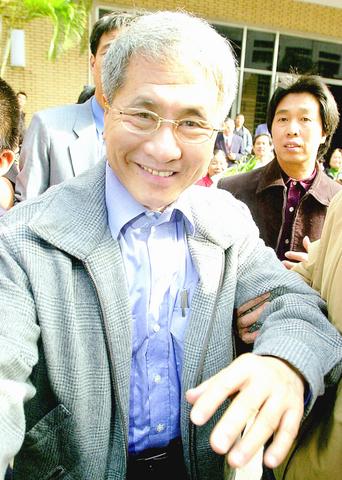Yu Fang-chih (
Sung claims to possess magical powers, which he uses to solicit donations with promises of power, wisdom or fortune. Both the mayor and his wife have been the cult leader's sincere followers for years.

PHOTO: LIAO CHENG-HUEI, TAIPEI TIMES
Sung was sued by some of his former followers for fraud in 1997. One of 17 defendants in the case was Yu, who was charged for helping Sung publish a series of religious books to attract followers.
Sung was found guilty that year, as was his assistant Cheng Chen-tung (
The case was appealed, and in yesterday's court session at the Taiwan High Court, Sung was accompanied by almost 100 followers, most holding flowers in deference to their leader.
During yesterday's proceedings, Yu said that she still firmly believes in Sung.
"Both my husband [Hsieh] and I still believe in Sung's divine powers to this day," Yu said yesterday.
After the session, Yu told reporters that Sung was absolutely innocent.
"I witnessed his divinity with my own eyes," Yu said, insisting that the cult leader's spirit could leave his body and move around.
In response, the Kaohsiung City Government issued a press release yesterday evening, saying that Hsieh supported his wife's words.
"Hsieh supports his wife and believes that her religious belief is good. He also hopes that people can respect the freedom of religious beliefs," the press release said.
According to police, Sung insisted during his investigation that he has supernatural powers and can get people to do whatever he says.
Police therefore invited him to display his powers in public. But he failed to persuade a standing police officer to sit down despite repeated attempts.
Sung also frequently used "divine photos" to win the trust of his followers.
The pictures usually depicted colorful rays of light in the sky and a ring of light around his head.
However, these photos were proven to have been doctored using basic computer graphics skills.
In 1997, then New Party Taipei City councilor Chu Mei-feng (
In 1998, Hsieh's close relations with the notorious cult leader were seriously questioned by the public during the Kaohsiung mayoral election.
It was not clear when the Taiwan High Court would rule on the appeal.

A preclearance service to facilitate entry for people traveling to select airports in Japan would be available from Thursday next week to Feb. 25 at Taiwan Taoyuan International Airport, Taoyuan International Airport Corp (TIAC) said on Tuesday. The service was first made available to Taiwanese travelers throughout the winter vacation of 2024 and during the Lunar New Year holiday. In addition to flights to the Japanese cities of Hakodate, Asahikawa, Akita, Sendai, Niigata, Okayama, Takamatsu, Kumamoto and Kagoshima, the service would be available to travelers to Kobe and Oita. The service can be accessed by passengers of 15 flight routes operated by

MORE FALL: An investigation into one of Xi’s key cronies, part of a broader ‘anti-corruption’ drive, indicates that he might have a deep distrust in the military, an expert said China’s latest military purge underscores systemic risks in its shift from collective leadership to sole rule under Chinese President Xi Jinping (習近平), and could disrupt its chain of command and military capabilities, a national security official said yesterday. If decisionmaking within the Chinese Communist Party has become “irrational” under one-man rule, the Taiwan Strait and the regional situation must be approached with extreme caution, given unforeseen risks, they added. The anonymous official made the remarks as China’s Central Military Commission Vice Chairman Zhang Youxia (張又俠) and Joint Staff Department Chief of Staff Liu Zhenli (劉振立) were reportedly being investigated for suspected “serious

ENHANCING EFFICIENCY: The apron can accommodate 16 airplanes overnight at Taoyuan airport while work on the third runway continues, the transport minister said A new temporary overnight parking apron at Taiwan Taoyuan International Airport is to start operating on Friday next week to boost operational efficiency while the third runway is being constructed, the Ministry of Transportation and Communications said yesterday. The apron — one of the crucial projects in the construction of the third runway — can accommodate 16 aircraft overnight at the nation’s largest international airport, Minister of Transportation and Communications Chen Shih-kai (陳世凱) told reporters while inspecting the new facility yesterday morning. Aside from providing the airport operator with greater flexibility in aircraft parking during the third runway construction,

Taiwanese and US defense groups are collaborating to introduce deployable, semi-autonomous manufacturing systems for drones and components in a boost to the nation’s supply chain resilience. Taiwan’s G-Tech Optroelectronics Corp subsidiary GTOC and the US’ Aerkomm Inc on Friday announced an agreement with fellow US-based Firestorm Lab to adopt the latter’s xCell, a technology featuring 3D printers fitted in 6.1m container units. The systems enable aerial platforms and parts to be produced in high volumes from dispersed nodes capable of rapid redeployment, to minimize the risk of enemy strikes and to meet field requirements, they said. Firestorm chief technology officer Ian Muceus said